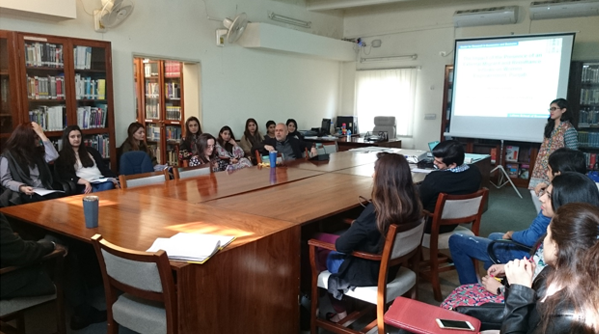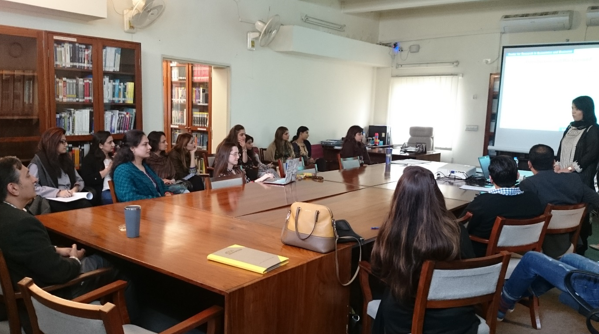 | Department of Economics |
| NEWS & MEDIA |
NEWS
Research Paper Presentation
Mehreen Irshad and Zainab Idrees presented their MPhil research (abstracts given below) in the Economics Faculty Departmental Meeting held on 22nd February, 2018, at 10:00a.m in TRC-1.

The Impact of the Presence of an External Migrant and Remittance Inflows on Women Empowerment, Punjab
Mehreen Irshad
Abstract
Pakistan is a developing country, and faces issues regarding gender inequality. Over the past 50 years a considerable number of people have migrated from Pakistan and inflow of remittances has increased over the past several decades which is marked as an important source of foreign exchange in Pakistan. This research aims to see the impact of external remittances and presence of an external migrant in a household on women empowerment. The data set being used is Multiple Indicator Cluster Survey 2014 (MICS) for Punjab. Women have been divided into 3 categories; All females, Married Females and Unmarried Females. These 3 categories have further been divided into age groups of 15-30 (younger women) and 31-49 (older women). Tobit model has been used for estimation. Furthermore, two separate instrument variables have been used; rainfall shocks for external remittances and historic migration for external migrant. The results show that households receiving external remittances have a higher women empowerment, while Households having an external migrant have a lower women empowerment, but households having an external migrant with a female household head have a higher women empowerment. Younger married women show a greater impact of empowerment on external remittances and external migrants as compared to other categories.

Corruption, Institutional Barriers and Innovation
Zainab Idrees
Abstract
Innovation and technological progress are considered as crucial factors for economic growth in the long run (Grossman and Helpman, 1993; Nelson and Winter, 1982; Romer, 1990). Differences in innovation and growth performance are often explained by differences in institutions and quality of governance, in particular corruption (Mo, 2001).There are two views regarding role of corruption for innovation and growth; first, corruption causes an increase in transaction cost which may hinder investment in R&D and eventually innovation (Mauro, 1995; Mo, 2001; Guetat, 2006; Dridi, 2013) and second, corruption may accelerate the innovation by speeding up the bureaucratic procedures especially in a developing country where institutional quality is relatively poor (Leff, 1964; Huntington, 1968; Acemoglu and Verdier, 1998). The aim of our research is to identify whether corruption greases the innovation and growth of firms by accelerating bureaucratic procedures, or rather sands it by deviating investments away from productive activities for Pakistan, using World Bank Enterprise Survey by World Bank.
 People
People